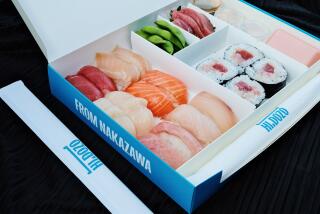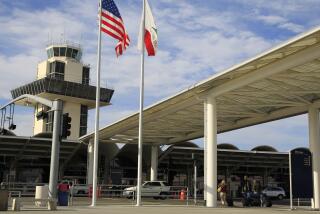Airlines, Cities in Fierce Battle for Japan Route : Federal Express Slot Can Benefit Carriers and Local Economies
- Share via
Honolulu wants more Japanese honeymooners to vacation on its sandy beaches. Denver wants to lure Japanese skiers to its snow-covered mountain resorts. San Jose wants to link entrepreneurs in Silicon Valley with scientists in Japan.
These cities have started to team up with U.S. airlines in an unusual competition for an air route between the United States and Japan. “Every city on the West Coast wants it,” said Mark Butler, a marketing executive with Alaska’s Anchorage International Airport. “Every city with an airport is going to try to get it.”
The competition among the cities, and among the airlines that want to fly to Japan, is the unexpected result of Federal Express’ acquisition of Tiger International, a Los Angeles air cargo carrier with a large and long-established presence in Japan. When Federal Express bought Tiger last December, it said it no longer needed its own Portland-Tokyo route.
The U.S. Department of Transportation hasn’t yet given its final approval to the merger between the two cargo carriers, although a decision is expected soon. Most industry experts expect the Transportation Department to allow Federal Express to give up its route, officially opening an intense competition for the Japan flight.
So far, five passenger airlines--Continental, American, Northwest, Delta and America West--have staked a claim to fly to Japan from Honolulu or, in the case of American, from San Jose. A cargo airline, Orion Air, is expected to bid for a route to Tokyo from Portland--the route served by Federal Express.
The Transportation Department would choose the successor to Federal Express and would also decide whether the route should stay in Portland. It would also decide whether the flight should be restricted to light cargo.
The passenger airlines argue that an existing agreement between the United States and Japan allows the Department of Transportation to convert the route from an all-cargo carrier and to shift its location from Portland.
Many cities, especially Honolulu, argue that the demand for passenger service is too great to ignore. The number of Japanese tourists who visit Hawaii each year is climbing by 10% to 15%, said Jeanne K. Schultz, deputy director of the Hawaiian Department of Transportation. “More would come if they could,” she said. “The demand is there.”
Airline industry experts, in fact, think the Transportation Department already signaled its intention to convert the route to permit passengers. In December, the department turned down Orion Air’s request that it be allowed to take over the Federal Express route. Orion contended it was entitled to the route because it was the department’s second choice, behind Federal Express, in the initial competition two years ago.
Michael J. Simons, Orion general counsel, says the air cargo line was disappointed. “We feel the route should be dedicated to small packages. There is plenty of competition on running passenger service to Japan,” he said. “No (U.S. carrier) will be running a route once Federal Express is merged with Tiger.”
A Transportation Department spokesman refused comment on the issue, saying it is “premature” because final action hasn’t been taken on the Federal Express-Tiger International merger.
Observers say it’s no surprise that so many airlines are lobbying for the Japan route. Since it is rare for a U.S. airline to give up a route between the two nations, few established routes ever become available. And though U.S. and Japanese governments are in talks over allowing more flights between the two countries, few in the airline industry expect an agreement this year. This makes the Federal Express route “a very significant route, a very valuable commodity,” said Rod D. Margo, an aviation lawyer with Condon & Forsyth in Los Angeles.
For passenger carriers, a Japan flight is potentially very profitable. When United, American and Continental competed for a Seattle-Tokyo route last year, the airlines estimated their profits between $22 million and $28 million, depending on fares. In January, Continental was awarded that route, which became available as a result of United’s $750-million purchase of Pan Am’s Pacific division in 1985.
And it is a market that’s growing. U.S. airlines saw their U.S.-Japan market increase by nearly 40% between 1984 and last year, making it one of the fastest-growing international markets.
The profits for a light cargo carrier aren’t certain, at least from the experience of Federal Express. Though the company has never discussed its performance on the route, it is widely believed that Federal Express lost money. Simons, of Orion Air, said Orion believes it can make money because it plans to use Gulfstream jets, which are smaller and thus easier to fill than the Douglas DC-10s used by Federal Express.
Portland, as might be expected, is looking for a cargo carrier to succeed Federal Express. But other airport cities want a passenger route. Officials in San Jose say a route would be a boon to high-technology companies in the Silicon Valley, which conduct business with Japan and other Asian countries. Currently, San Jose doesn’t offer any Asian flights.
Airport officials at Denver’s Stapleton Airport think their tourism market is under-developed because it doesn’t have direct Japan service. But, acknowledges Gennifer Sussman, senior economist for the airport, the metropolitan area can support only three nonstop flights a week to Tokyo right now.
Officials in Denver have tried to interest Continental and United, its two biggest carriers, in flying to Tokyo from Stapleton, but without success.
It is Honolulu that has attracted the most interest from U.S. airlines vying to take over the route from Federal Express. That is in part due to growing demand for flights from Hawaii, as well as a push by the Hawaiian government for more air service.
An additional flight from Hawaii “would be a small drop in the bucket,” said Schultz. “But we don’t want to pass up this opportunity” created by the merger of Federal Express with Tiger, she said.
More to Read
Sign up for Essential California
The most important California stories and recommendations in your inbox every morning.
You may occasionally receive promotional content from the Los Angeles Times.













